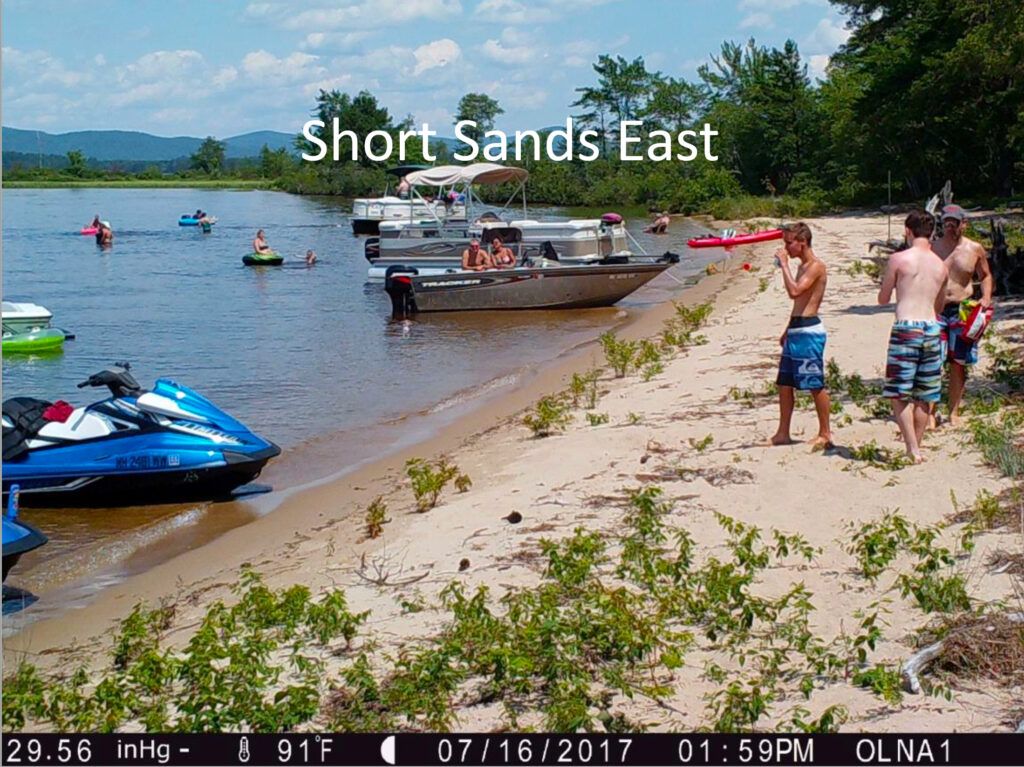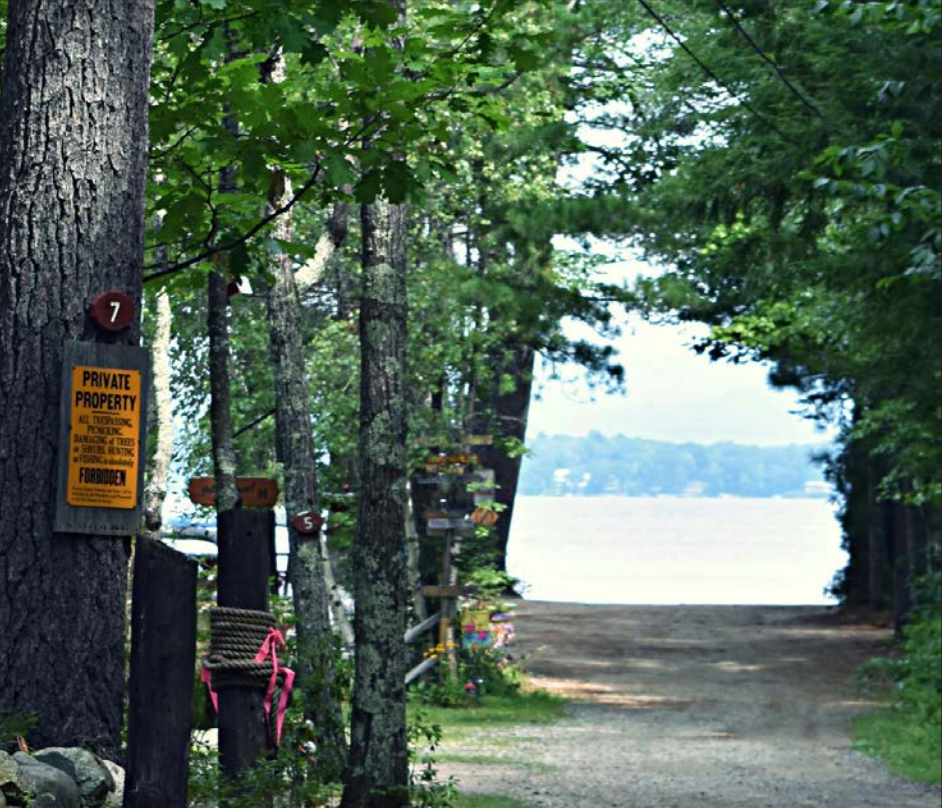From the Archives: A Public Beach in a Natural Area
Part Six: A Continuing Challenge
Fifteen years after the Natural Area management plan went into effect, it is fair to say that it has accomplished most of what it set out to achieve. It is also fair to say that it remains a work in progress, with the final outcome always in doubt because the state lacks the resources to make it otherwise.
Rare plants and plant communities in the closed portion of the preserve have made a comeback and continue to be studied and documented. Although some rare species were lost over time, a previously undocumented rarity was found several years ago, lifting the spirits of biologists.

The use of technology, including cameras, began in 2017 and showed promise before being canceled during the pandemic. Source: N.H. Department of Forests and Lands
The public section of shoreline has remained open for low impact recreation by boaters, but respect for the principle of self-monitoring compliance declined during the Pandemic summer of 2020 and has worsened since then.
The distain for authority and lack of civility that characterize our times have made life on Ossipee Lake a lot different from what it once was, and the lake community continues to consider what that means for the future.
On a positive note, DRED is gone—split into parts by Republican Governor Chris Sununu in 2017. The Natural Area is now under the control of the Division of Forest and Lands, which has new leadership and is part of the Department of Natural and Cultural Resources, which reports to the Governor.
On the downside, staffing and funding shortages, and a lack of inter-agency coordination, are continued reminders of Don Kent’s warning not to rely too much on Concord.
For years, volunteer boaters working with Ossipee Lake Alliance and Green Mountain Conservation Group helped keep things right-side-up at the site, including educating boaters and conducting an annual site clean-up.
But that work relied on the cooperation of boaters, and all but one of the boater-influencers in the Working Group have quit, citing the state’s continued unwillingness to revitalize the stakeholders’ forum and its inability to enforce the site regulations. None of the boaters who resigned were replaced.
Lessons Learned
The Natural Area story offers a few instructive lessons, the main one being that finding common ground to achieve mutually beneficial goals is always a winning strategy.
The adoption of the Natural Area Management Plan remains a source of pride among those who participated in the process, and Don Kent and George Bald continue to be remembered by boaters and conservationists alike as inspiring leaders and drivers of success.
There is also a darker lesson. From the start, the beach-in-a-natural-area idea was illogical and unworkable, and its no-cost financial proposition was a fiction. To deflect from that reality, local officials cynically promoted the plan as a wedge issue, generating a measure of public support by ensuring a public fight between factions that prevented compromise.
So poisonous was the atmosphere that when lake property owners and conservationists offered to help the town find an alternative beach site on the lake, Town Hall declined the offer. How different the Natural Area story might have been had the parties worked together from the start of the process.
A Beach Coda
The determination of Ossipee officials to have a town beach on Ossipee Lake outlasted the Natural Area story. In August, 2017, then-Select Board Chair Rick Morgan announced he had an agreement to purchase Camp Sokosis for $1.2 million from long-time property owners Bill and Dianne Sheehan.
The 52-acre Ossipee Lake property had a campground, boat slips and enough beach for campers and townspeople alike. Morgan said the town could afford the down payment, and he projected revenue from the business would pay for the bond.
“It’s a perfect opportunity for the Town of Ossipee to have a beach on Ossipee Lake without the taxpayers having to pay for it,” Morgan told the Carroll County Independent, echoing Harry Merrow’s Natural Area sales pitch.

Ossipee’s agreement to buy the big lake’s Camp Sokosis as a town beach was a good news story that quickly turned sour. Photo: Carroll County Independent.
Since there were no environmental issues, it would be a straight up or down town vote on value vs. cost.
Morgan worked the deal hard as Ossipee’s “last opportunity” for a beach on the lake, but the proposal quickly became contentious. Financial questions arose about how the property would be managed, and by whom, and how the town would address the loss of $25,000 in annual property tax revenue.
Long-time Camp Sokosis campers made it known they were unhappy with the Town’s plan to eliminate one-third of the campsites. Yet the momentum appeared to be with Town Hall until the property owners developed cold feet.
In a newspaper interview, Bill Sheehan said Selectman Morgan had pressured the couple to sell, and another potential buyer was waiting in the wings who would donate 90 feet of shoreline to the Town at no cost, relieving it from having to manage a commercial business and preserving the annual tax revenue.
Morgan pushed back, saying the Sheehans had plenty of time to consider their options. He conceded that a free beach offer had been made, but said the town had already decided to purchase the entire property and the new offer lacked adequate parking.
Opponents of the purchase had a field day, plastering the town with “Do the Math” lawn signs mocking Morgan’s rejection of a potential deal for a beach at no cost in favor of spending $1.2 million to obtain the same thing.
Ossipee Select Board members responded to the criticism by publicly calling opponents of their purchase plan “arrogant,” “pathetic,” “un-American,” and “cowardly.”
Then, in a baffling turn, Morgan announced that the town would close the campground entirely if it became the new owner—a move that would have violated the purchase agreement and eliminated the revenue needed to pay for the bond.
The vote on the purchase took place on November 28, 2017, following a noisy public debate. In the end, a majority of the attendees approved buying Camp Sokosis, but the total fell short of the required two-thirds majority.
The following day the Sheehans signed an agreement to sell the business to two long-time campers. Despite the failure of the town vote, Ossipee sought an injunction to block the sale. It sued the Sheehans for breach of contract and fraud, and the Sheehans counter-sued, claiming fraudulent and negligent misrepresentation.
Ossipee residents Joy Gagnon and Joshua Arnold piled on with a civil complaint arguing that the vote was compromised by the town’s failure to meet the open meeting provisions of the state’s Right to Know Law. They asked the court to require a new vote.
It would take until February for a Superior Court Judge to sort things out, but in the end the situation remained as it was after the November 28 vote. Ossipee’s beach plan was dead, and Camp Sokosis remained in private hands.
These Days
George Bald left DRED in 2012 but continues to work for the state as Chairman of the Lakeshore Redevelopment Planning Commission. He is also on the Board of Directors of the New Hampshire Center for Public Interest Journalism.
After leaving DRED in 2008, Sean O’Kane worked briefly as a political volunteer for Democrat Jeanne Shaheen, then became an independent business advisor and consultant, most recently as managing director of Stratögé Partners in Portsmouth, and Advisor to Global Citizens Circle.
Parks & Recreation executive Allison McLane joined Eversource Energy in 2008 after ending a 19-year run at DRED. Her current job at Eversource is Manager of Community Relations and Economic Development, according to her LinkedIn profile.
Dick Boisvert retired as New Hampshire State Archeologist in 2018 after 30 years of state service. His DRED colleague, Natural Heritage Bureau’s Lionel Chute, left DRED in 2006 and is Director of Natural Resources for Sullivan County, New Hampshire.
Don Kent remained at DRED until 2012, then worked for environmental organizations in Virginia and Maine. His current title is Research Director for the Massachusetts Department of Conservation and Recreation.
Ossipee official Harry Merrow ended a six-year run as State Representative in 2008, then served again from 2010-14, at which point he stepped down and also resigned from the Select Board. He was honored as Ossipee’s Citizen of the Year in 2015 and remains active in community affairs.
After completing his term on the Ossipee Select Board, Rick Morgan took a year off, then ran unsuccessfully to return to the Board in 2020. He continues to live and work in Ossipee.
Editor’s Notes: Our thanks to Jean Marshall for her extensive research on the early days of the Natural Area prior to the state’s purchase. News stories by Terry Leavitt, then-editor of the Carroll County Independent, and by Conway Daily Sun reporters Nate Giarnese and Daymond Steer helped us expand our own reporting to create this series. We are grateful for their work.

Great series; very informative. My family’s association with Ossipee Lake started with day trips to “Lone Pine”, so this was especially meaningful. Thank you.